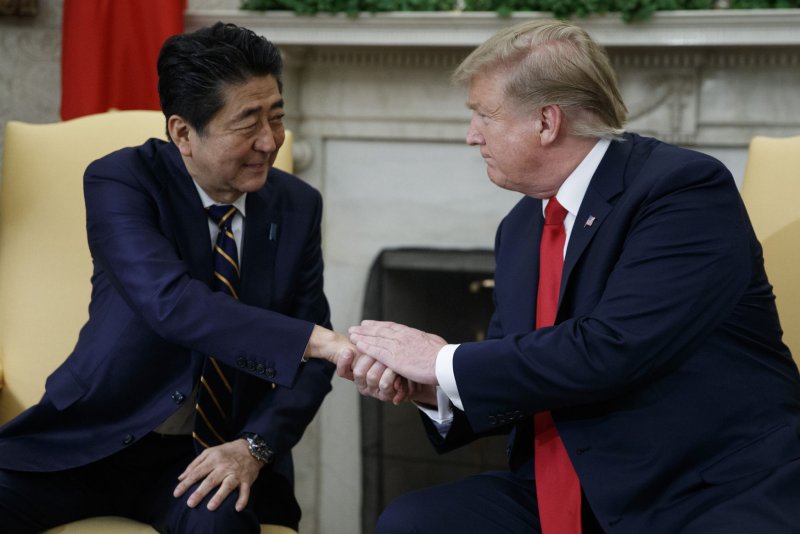Japanese Prime Minister Shinzo Abe (L) could successfully mediate between the United States and Iran. File Photo by Shawn Thew/UPI |
License Photo
June 5 (UPI) -- During U.S. President Donald Trump's four-day state visit to Japan, Prime Minister Shinzo Abe offered mediation between the United States and Iran amid rising tensions. Trump happily accepted the offer.
Many are skeptical about this offer. Iranian Foreign Minister Javad Zarif seemed unimpressed by the Japanese mediation offer following his tweet saying that Trump should make his intentions clear through actions and not talks. The Jerusalem Post jumped to the conclusion that the mediation will not work, arguing that there is simply too much to mediate. The military buildup in the Gulf is not a onetime event. It is the result of an accumulation of events and actions and a consequence of many problems: Syria, Israel, Lebanon, Iraq, Yemen...
I argue otherwise. The mediation has a fair chance of succeeding. For starters, both parties have no appetite for war. The acting U.S. defense secretary, Patrick Shanahan, said: "It very clear that Trump does not want war." Trump ran on a non-interventionist agenda. He would definitely not want to start a new war as he is launching his 2020 presidential campaign.
On the other side of the fence, Zarif also announced that Iran does not want war. Most importantly, Iran proxies are worn out and do not want to fight anymore. Hezbollah fighters are relieved that the fighting has nearly ended in Syria and they are starting to go back home. The last thing they want is to be recalled for another battle. A similar attitude is prevalent among Iran-linked militias in Iraq.
Though both parties realize that the fight will be futile and devastating, no one wants to lose face. This is why the rhetoric on both sides keeps going up and down. Trump threatened that any aggression from the side of the Islamic republic will mean "the end of Iran." Iran answered that Trump is a "crazy president" whose threats are not going to work and that Iran is ready for the fight. Hezbollah's secretary general, also retaliated during the Quds Day by saying that the armed group has a precision-guided missile that can reach deep into Israel.
While both parties are putting on a show of force, they are both hoping that the tension will calm down. This is why both Iran and the United States are craving this mediation. This is one step toward making it work. Other stakeholders in the region would welcome the mediation as a way to prevent more chaos. Russia is carving a role for itself in the region by intervening in Syria. It certainly does not want to see more fighting in the country. Its aim is to see stability as soon as possible in order to reap the rewards from its intervention.
During a meeting Friday, between Russian Foreign Minister Sergey Lavrov and his Japanese counterpart, Taro Kono, Lavrov said Russia welcomes the talks between Iran and the United States. All those factors facilitate Japan's intended role.
Japan is a good candidate to mediate between the United States and Iran. Though Japan is the third economic power in the world, since WWII, it has had very little role in world affairs. This gives Japan the advantage of a clean record. On the other hand, Japan has good relations with the different parties. A week before Trump's visit, Zarif was in Japan and Abe urged him to exercise maximum restraint. Japan has also been importing oil from Iran for decades before the recently imposed sanctions.
However, in order for the mediation to work, it has to be broad. It has to set the general principles on which to start serious and meaningful negotiations. And though it will not solve all the problems, at least, it can start the process. If we go back in history, to the 30 Years War that shattered Europe, we see that the treaty of Westphalia that ended the war was not drafted in one day. It took almost 10 years of negotiations and several congresses that convened to streamline differences. Nevertheless, a process needs to be initiated. What is expected from Abe is to find a common ground, not only for the United States and Iran, but also for Iran and its Arab neighbors, to sit and talk. The main role of Japan as a mediator is to find a face-saving formula where none of the parties will look like a loser.
Dania Koleilat Khatib is an affiliated scholar at the Issam Fares Institute for Public Policy and International Affairs at the American University of Beirut. She specializes in U.S.-Arab relations and researches sectarianism, extremism and governance. Her book "The Arab Lobby and the U.S.: Factors for Success and Failure" was published by Routledge UK and translated to Arabic.















